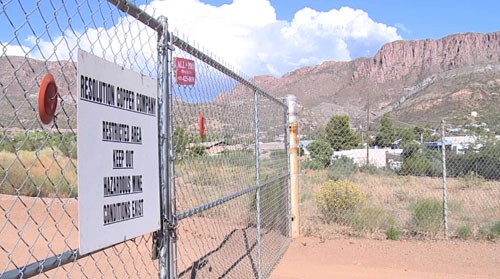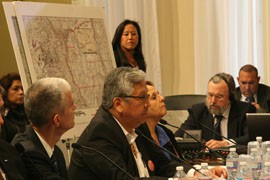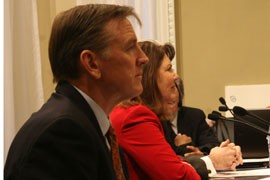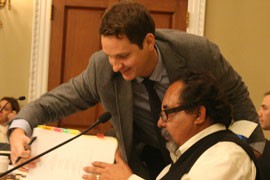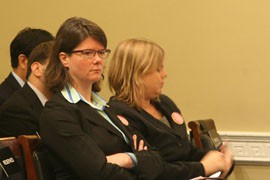Cronkite News has moved to a new home at cronkitenews.azpbs.org. Use this site to search archives from 2011 to May 2015. You can search the new site for current stories.
Tempers flare in hearing over new Resolution Copper land-swap bill
Editor’s Note: A previous version of this story incorrectly stated the amount of copper the Resolution Copper mine could ultimately produce. The company estimates that the mine could supply about one-fourth of the U.S. demand for copper over the next several decades, based on current consumption. The story has been updated to reflect the correction.
WASHINGTON – A four-hour congressional hearing grew testy Thursday as House members considered a bill to swap thousands of acres of private and federal land to make way for a massive copper mine in Southeast Arizona.
The bill to trade land near Superior with Resolution Copper Mining, passed the House last year but stalled in the Senate, and is back now for an eighth year.
Supporters said the deal, which would give Resolution access to a copper-rich piece of government land, would bring thousands of jobs and more than $6 billion in new taxes to the state over 40 years of operation.
“The economic benefits are staggering,” said Rep. Paul Gosar, R-Prescott, who co-sponsored the bill with Rep. Ann Kirkpatrick, D-Flagstaff.
The company says the mine would be the largest copper producer in the country and would supply about 25 percent of the nation’s copper needs, turning out 1 billion pounds or more a year.
Opponents worry about the environmental and cultural impact from a mine of that scale, and they question why the government would swap such a valuable resource with a company that is not American-owned. Resolution’s parent companies are based in England and Australia.
“At a time when all Americans are being asked to tighten our belts, this bill will result in a giveaway of American wealth to a foreign-owned mining company,” said Terry Rambler, chairman of the San Carlos Apache Tribe.
He also said the massive copper mine would deprive the tribe of sacred lands at Oak Flat, a popular recreation spot, and that the mining process would harm all lands in the area.
Rambler and other critics said the potential loss of water in the area is a particular concern. He pointed to ancient oak trees in the area that take centuries to produce a single acorn.
“These trees will be destroyed and the land flattened,” Rambler told the House Committee on Natural Resources subcommittee.
The bill would give Resolution 2,422 acres of U.S. Forest Service land in the Tonto National Forest, in exchange for 5,344 acres of environmentally sensitive land currently owned by the company.
Gosar said the region has been suffering economically. The mine would create 1,400 high-paying jobs that, in turn, would bring about 2,300 more jobs to the area.
Resolution officials said it is important to pass the bill quickly. Continued delays caused the company’s main sponsor, British mining company Rio Tinto, to pull funds from the project late last year and cut 200 jobs, with another 200 job cuts expected before the end of this year.
By the end of this year, the company will have spent almost $1 billion and it expects to spend more than $5 billion before ever producing a pound of copper, said Resolution spokesman Bruce Richardson. He said production is not expected to begin before 2020.
But Rep. Raul Grijalva, D-Tucson, a longtime opponent, said there is no point in holding hearings about the bill until both sides are willing to have a “meaningful discussion” on the issue. The same arguments keep being rehashed without any of the questions being answered, he said.
“Here we go again,” Grijalva said Thursday.
He pointed to what he called a lack of public support as one reason not to rush into a decision.
“All we have is the legislation to go by as fact,” Grijalva said. “There has to be an independent look at what this mine is going to be.”
Superior Town Councilwoman Kiki Peralta said the town, which has many residents employed by the mine, supported the project in the past. But she said that after learning about the potential environmental impact, she was forced to speak out against it.
“This project will be in our backyard and we can’t let that happen,” Peralta said. “Information has been difficult to come by, but with the little information we have, we have learned the true impacts of this project.”
Earthworks Executive Director Jennifer Krill noted in her prepared remarks that mining was banned on much of the government land in the 1950s, and allowing a swap now would set a “chilling precedent” for reversals of other bans. The Resolution project, she said, would “leave a permanent scar on the landscape” that would damage recreation areas and the opportunity for jobs there.
But Gosar said there is no reason for delay and that opponents simply do not understand the facts.
“This is a good bill all the way through,” Gosar said. “I’m not here to compromise a bill just to get people to get on board.”
Kirkpatrick said her district was “hit hard by the recession” and could use an influx of jobs and tax revenue. But she said environmental impacts of mining will need to be addressed before the bill can go through. She is considering amendments to protect land and water in the area.
“There is a way to work together,” Kirkpatrick said.
While Gosar said he would be open to compromise, he said he has not seen any efforts by opponents to alter their stance.
“We’re grasping at straws, basing not on facts but on hearsay,” he said.
For their part, company officials said the project is not going away, even though they would like to see action sooner rather than later. Richardson said Resolution expects to finish its mining operations plan and submit it to the Forest Service for environmental review this year.
“There’s too much copper there,” to walk away, Richardson said.

